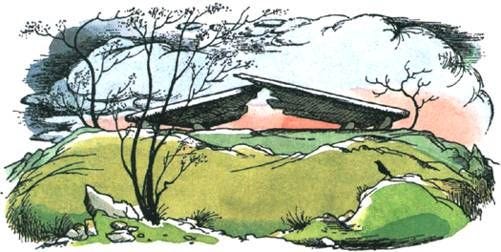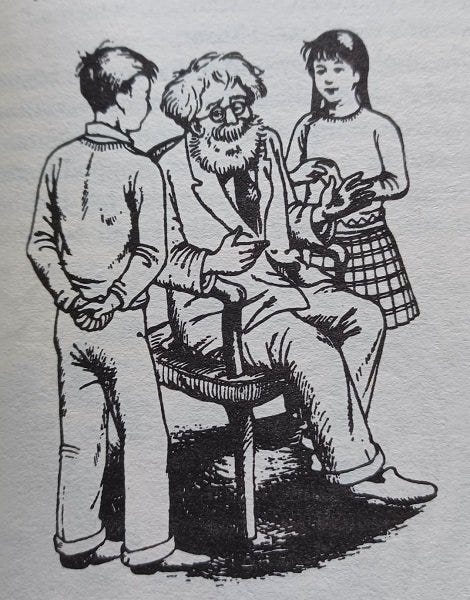Bedtime Stories: The Lion, the Witch and the Wardrobe
Re-discovering Narnia through the eyes of my six-year-old daughter.
Few books are as special to me as The Chronicles of Narnia (C.S. Lewis). While I’ve only read the series twice, each instance has been transformative. Beyond the allegory, these books represent both my childhood and my transition into adulthood. Their presence on my bookshelf is a physical reminder of emotions and memories so essential that I can’t separate them from my own innate sense of ‘self’.
It’s a strange kind of irony that these books - written by a ‘reluctant convert’ to tell the story of Christ to children - have become somehow sacred to an avowed atheist entering middle age.
I last read the series as part of a personal rite of passage, shortly before my 18th birthday. Since then the box set has sat patiently on my bookshelf, as I waited to see if I would be invited to read them again. After all, Aslan calls us to Narnia, we don’t decide when to visit.
So imagine my delight, when, last month, my little girl came home and asked me if I knew about a book with a lion and a wardrobe in it. How fitting that the innocence and excitement of my very own “daughter-of-Eve” would unlock the land of the White Stag, Cair Paravel and Aslan to me once again.
After 20 years, I finally dusted off The Lion, the Witch and the Wardrobe. Could it possibly live up to memory?
“Once there were four children whose names were Peter, Susan, Edmund and Lucy. This story is about something that happened to them…”
This isn’t the greatest opening line in English Literature (that accolade might go to The Voyage of the Dawn Treader1), but as I speak those words aloud, I’m reminded of Lewis’s gift for simple storytelling. Any fears that my six-year-old daughter will be too far removed from the language of this mid-century writer dissolve. She is instantly engaged, and I’m experiencing a moment I’ve been dreaming of since before she was born.
But where did this passion of mine come from? Let’s go back in time to a different bedroom, where a different voice is speaking these words to me for the first time.
These are books that my Dad read to me and my sister. That on its own made it special in my mind, as in the main it was my Mum who performed the night time routine. My understanding is that Dad chose to read us these books because they meant something to him; he wasn’t just telling us a story, he was passing something down to us. Even at such a young age, I knew that this experience was more than just a bedtime story.
Looking back, I couldn’t tell you whether these first encounters spanned over a few weeks, months or years; time is always a slippery thing when you’re living in Narnia. All I know is that while the years have made the memories foggy, having shared those moments with my Dad and my sister is of the greatest importance to me now.
I can only hope that I’m able to give my daughter the same gift. That one day she’ll find herself staring at her own box set, wondering from where her next invitation will come. But that won’t be my story to tell…
My story resumes by the side of her bed, as we take our first steps together past the fur coats and into the forever winter (but never Christmas!) of Narnia that Mr Tumnus and his comrades have endured for so long.
As an adult, I’m astounded by just how much story can be found in so short a book (172 pages), but this is perfect for the agile mind of a six year old. She doesn’t need page after page of prose; her imagination creates a more vivid and magical world than words could ever paint. Each evening we can’t help but read two or three chapters at a time. My daughter simply has to know what happens next, and every time I feign reluctance and agree to five more minutes, I’m declared the best Daddy that there ever was.
Some nights I’m convinced that she won’t make it through the last chapter - her head dropping to the pillow and her eyes half closed. But then the next evening she can recite every detail we read. This is how I know she’s engaging with the book at her own level, not simply humouring me. She’s understanding the story and drawing her own conclusions about the characters we meet.
Edmund: At first she can’t understand why he tells lies about his earlier trip to Narnia, so I remind her that he’d been making fun of Lucy and might be embarrassed. She tells me that Edmund doesn’t mean to be so naughty, but that he is feeling proud. It’s a bit like when she knows she wants to say sorry, but she can’t just yet.
The White Witch: This is a remarkably emotional journey to witness. At first, she won’t accept that a queen could ever be a baddy, but the more she hears from Mr and Mrs Beaver the more she questions her belief. When Edmund finally enters the Witch’s halls she learns, along with him, that grand titles and Turkish delight can be deceiving. She now tells me confidently that she’s definitely, definitely the baddy.
Aslan: She doesn’t immediately resonate with Aslan, she can’t tell if he’s grumpy or kind. Then comes the moment he reveals to the sisters his plan to sacrifice himself for Edmund - I see her pupils dilate when the Witch raises the knife. She tells me that if I died she wouldn’t want to go on living. [Here I put the book aside and explain that should I die, her only job would be to live as happily as possible and try to remember to think of me from time-to-time - she nods and promises to do just that]
Each night a new experience: despair for lost friends, fear of tyranny, hope, valour, sacrifice and forgiveness. This beautiful, short, simple book lets me talk to my daughter about morality, philosophy and politics. We gently explore death, and what it means to live with guilt. This is theology distilled into its purest form - with a message of love and kindness that I simply can’t disagree with despite my personal beliefs.
I was first confronted with the shoots of these beliefs on my second journey to Narnia - a few days before my 18th birthday. As I found myself staring into the face of adulthood, I embarked on a personal journey to re-visit key aspects of my youth. I decided that it would be fitting to read The Chronicles of Narnia as the ‘last books of my childhood’.
That adventure into the magical lands didn’t start with grandiose intent. I was seventeen - I didn’t have a worldview to validate and my youth was barely discovered, let alone lost. But what I found between those pages was more than simple nostalgia, there was a subtle riptide of theology that gave me cause to struggle.
For several years up until this point, I had become quite heavily involved with my local church. As a young teenager, I struggled at school, which is a very lonely experience. Through my neighbours I was eventually introduced to a local church youth group and quickly found myself immersed in a thriving and loving social circle. I joined my new friends as they attended church and quickly embraced Christianity with a genuinely evangelical fervour.
Looking back now I honestly can’t tell you whether I truly believed, or simply truly wanted to. Whatever the realities of my faith, I was happy. Christianity became a core part of my identity, and I wore it proudly on my sleeve.
But life moves quickly at that age. As my eighteenth birthday approached, friendship groups had begun to drift and I found myself spending less time at church. Despite this I couldn’t begin to let go of such a key part of my identity - I would still argue passionately for Christianity, yet practised it less frequently.
Now I know this wasn’t Lewis’ intentions, but as I read the final pages of The Last Battle, I came face-to-face with the intolerance, inconsistency and hypocrisy that can be found throughout Christianity (and other religions). How could Aslan - the hero who sacrificed himself for a traitor - abandon a Queen of Narnia over something as trivial as lipstick? Does infinite love really come with such trivial conditions attached?
It took me another four years of internal struggle - during which I often found myself making half-hearted public arguments in defence of God - before I could finally say it out loud. But as the land of Narnia disintegrated around me, I said farewell to Aslan and passed into adulthood equipped with the critical tools that would eventually lead me to embrace atheism.
And I do embrace atheism as a positive influence in my life - which doesn’t diminish the happy experiences I had as a child and an evangelical youth. It’s the fact that all three of these identities are tied up in these stories that makes me value them so.
When I glance at the shelf and see the colourful books with uncracked spines waiting patiently for me, I remember the safety and warmth of my bedtime stories. I cannot reconcile my empirical experiences with a belief in God, but there is a patient beauty and human kindness in Christian morality. Reflecting on the allegory in these pages lets me remember the warmth of fellowship, without suffering the dogma.
I’m still at the beginning of my third adventure in Narnia, this time I’m not the main character, merely a guide. By stepping into my Dad’s role I hope to understand how he may have experienced those long-past evenings. But now it’s my daughter (and in a year or two, her siblings) who will fight alongside Prince Caspian, sail to the edge of the world with Reepicheep, and ride with Bree across the plains. As a guide I will protect them from danger - we will probably avoid the tricky terrain of The Last Battle this time around - but I must tread lightly so as not to overtly influence their personal relationships with these characters.
I’m not so sure I’ll get to visit Narnia for a fourth time. It would be lonely to return on my own. Would that world still come alive without companions - my Dad and sister, my youthful self, my children - to share it with? My time there is coming to an end, and that’s as it should be. It’s enough to hope that I succeed in passing down custodianship to the next generation.
That’s not to say I’m doomed to forget Aslan. I’m ready to assume the role of the professor, gently encouraging and always willing to listen to the most fanciful of stories and divine the truth.
These books will always remain a part of my identity: not for the stories they tell, but the memories they leave imprint on me. While they may gather dust on my bookshelf, they’ll look down on three generations, united by joyful experience.
“There was a boy called Eustace Clarence Scrubb, and he almost deserved it.”








Beautiful! It made all warm and fussy inside. Thank you for sharing!